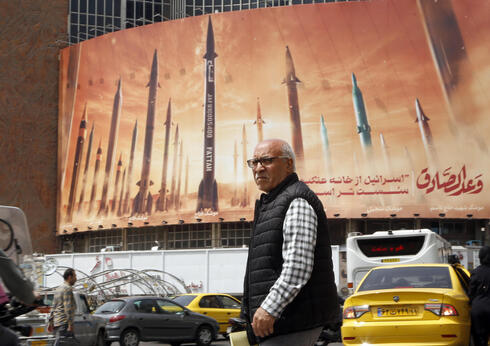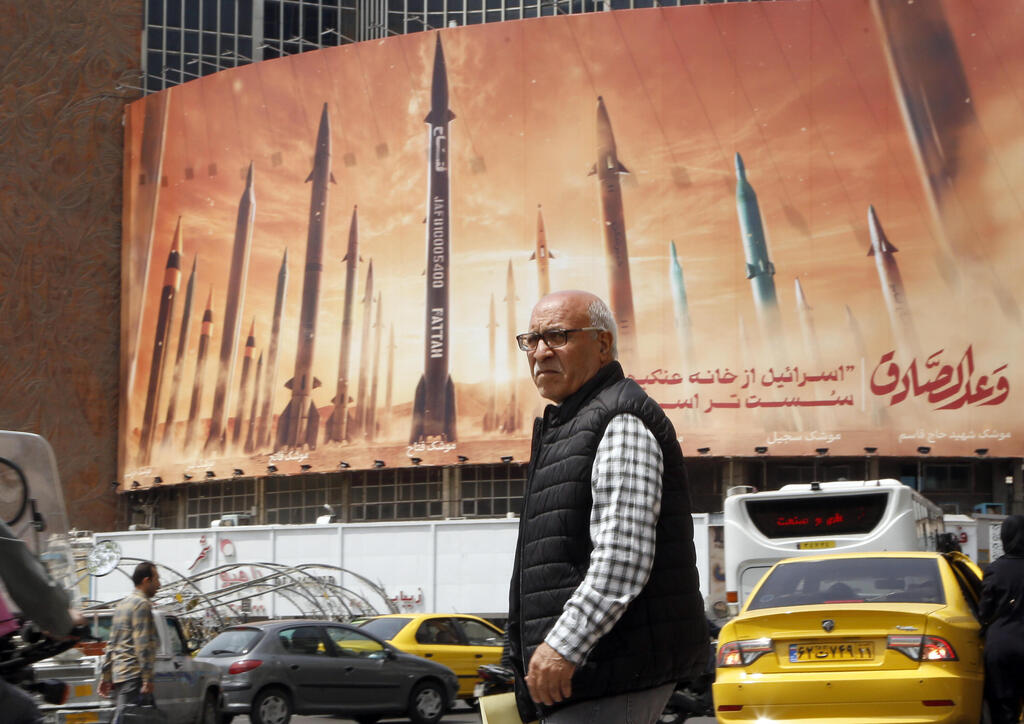
Iran's regime celebrates, but citizens' anxiety grows
Following their attack on Israel, the Iranian regime is projecting a sense of success and accomplishment which is not felt by the public, who fear the consequences of a war with Israel and crippling sanctions
Iran is closely monitoring reports from Israel about a significant response to the Islamic Republic’s unprecedented attack on Saturday night, which included the launching of over 300 drones and missiles. Senior government and security officials in Iran have been busy issuing threats against Israel, warning that any response will be met with a more severe Iranian retaliation than the initial attack. The Iranian regime and its supporters have been intoxicated with the power and satisfaction from the attack, despite the potential consequences or that 99% of the missiles failed to reach Israeli territory.
However, among the broader Iranian public, which mostly does not support the regime, there is deep concern, particularly about the potential economic consequences of a possible regional war. Official figures indicate an annual inflation rate of about 41% in Iran, although independent economists estimate a much faster actual rise in prices than the Iranian authorities are willing to acknowledge. The depreciation of the local currency - the rial - against the dollar since the current tensions with Israel began in April is exacerbating concerns about looming price hikes. Since the Iranian attack, the rial has fallen to around 660,000 against the dollar on the black market from 700,000 before the attack against Israel.
According to sources in Iran, the central bank has taken a series of measures, including injecting dollars into the market to slow down the depreciation of the rial. The Tehran Stock Exchange - another indication of the Iranian market - is also subject to government restrictions: after the main index plunged by about 7% amid fears of a confrontation with Israel, authorities limited daily trading to a maximum decline of 1% for each stock. This explains why the market has "stabilized.” On Monday, the main index recorded a slight increase of just under 0.5%, while on Tuesday, the stock exchange closed down by 0.2%.
While the Iranian government controls the media, Iranian public sentiment is restricted to graffiti written under the cover of night on the streets of Tehran, as well as through social media, where concerns about economic consequences and criticism of the Iranian attack against Israel are regularly expressed. For example, on the Telegram channel of "The Council of Professional Unions of Iranian Teachers," which tends to criticize the government's economic policy, it was written that "by sending dozens of drones and missiles to Israel, Iran’s government has opened an attack which, even if it ends in just one night, its victims will be women, children, and the poor."
Another body that frequently criticizes the government's economic policy, "The Free Union of Iranian Workers," wrote that "by launching hundreds of missiles and rockets at Israel, the Islamic Republic has embarked on an adventure and started a war that, with its possible expansion, a country of 90 million will become scorched earth. It seems that the rulers are fulfilling their latest mission to destroy the country after 46 years of gradual destruction."
Another user said that the Iranian attack constitutes a strategic failure because it exposed Iran's limited military capabilities. They wrote: "The [Iranian Revolutionary Guards] said that the purpose of the missile attack on Israel was to avenge the killing of several generals and commanders in Damascus, even though hundreds of generals and commanders of the Revolutionary Guards and other senior officials were killed by Israel in recent years. But the important and interesting thing is that the 'severe revenge' and loud but hollow attack ended without even one Israeli general or military official being harmed. Moreover, not even a single Israeli soldier was injured.
"Yet, the Islamic Republic’s military, political, and diplomatic authorities all insist that the revenge has been completed. In actuality, they are begging that [Israel] not to continue! But this was another big and strategic mistake, and now Israel and every other country knows that the missile power of the Islamic Republic is essentially equal to the military power of the Houthis, Hezbollah in Lebanon, or Hamas. The implication is that any foreign military force can attack the Islamic Republic and humiliate it, and the regime has no ability to cope with it."
For the moment, the global oil market appears calm as it waits for the situation regarding Israel and Iran to become clearer. Small declines in the price of Brent crude were recorded on Monday and Tuesday, standing at just over $89 a barrel. On Tuesday, it crossed the $90 threshold before falling later that day. Last week, before the Iranian attack, oil prices reached $90.45 - their highest since the start of the war in October.
Risks to the oil market have been on the rise in recent months due to Houthi attacks in the Red Sea and Ukrainian attacks on Russian oil fields. An Israeli retaliatory attack against Iran could potentially raise prices by $4-5 a barrel for a limited time. However, a rise to around $100 per barrel is only expected if the escalation with Iran leads to a significant disruption in the oil supply, which seems less likely at the moment.
The market has also been calmed by the assessment that the Biden administration will not respond to the attack on Israel by intensifying sanctions on the Iranian oil sector, despite pressure from Republican lawmakers in Congress to do so. Since the start of the war in Ukraine in 2022, the Biden administration, aiming to prevent shocks to oil prices, has pursued a lenient enforcement policy of sanctions on Iranian oil. This has allowed Iran to achieve its highest oil production since 2018, when former President Trump announced the U.S. withdrawal from the Joint Comprehensive Plan of Action (JCPOA) and returned to the sanctions regime.
According to data from Taqa, the Abu Dhabi National Energy Company, Iran's average crude oil production has increased to 3.170 million barrels per day in the first quarter of 2024, compared to 2.568 million barrels per day this time last year. It should be noted that Iran's crude oil production increased to 2.859 million barrels per day at the end of 2023, compared to 2.554 million at the end of 2022. Since Iran does not publish data on its oil sector, estimates suggest that it currently exports between 1.3-1.6 million barrels per day, mostly to China via third-party countries.
The Biden administration is in a dilemma; on the one hand, it wants to punish Iran for the attack, but on the other hand, it does not want to raise regional tensions. Stringent enforcement of oil sanctions is one of the options at its disposal. Such a move would hurt the Iranian regime since oil revenues are its main source of income, but the Biden administration is reluctant to do so as it would threaten stability in the global oil market, where Iran holds a 3% share, and would strain relations with China.
The writer is the Head of Operations at Concord MENA.














